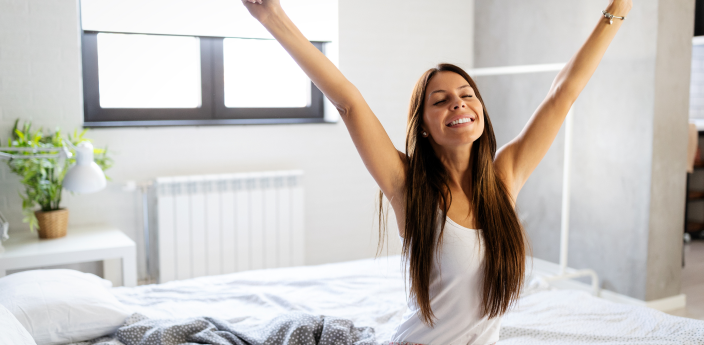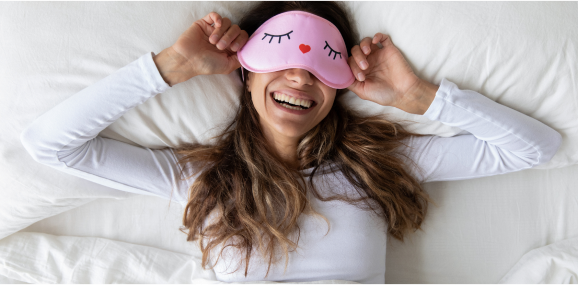Everyone has experienced those days when you just seem to be dragging. It’s the middle of the day and the yawning starts and doesn’t seem to stop. You can’t seem to shake the daytime sleepiness.
Having days like this periodically is no big deal — we all have them. Maybe we had a rough night of tossing and turning. So, some daytime sleepiness is expected. However, excessive daytime sleepiness can get in the way of work — and more.
Excessive daytime sleepiness doesn’t happen by accident or out of the blue. Typically, the real issue starts at night and is caused by poor sleep hygiene, irregular sleep schedules, and more.
Let’s take a look at some of the causes of excessive daytime sleepiness and some ways you can help recapture your daytime energy.
A Look at Daytime Sleepiness
In short, excessive daytime sleepiness is often described as difficulty staying alert and awake during the day, coupled with an increased desire or urge to sleep during daytime hours. This can cause some serious issues.
Being sidelined by excessive sleepiness during the day can really cut into your productivity. But, if you are constantly feeling drowsy and groggy throughout the day you are certainly not alone.
According to national sleep statistics, excessive daytime sleepiness affects roughly 20 percent of the adults in the United States, making it one of the most common sleep-related symptoms and reasons for sleep clinic visits.
The symptom goes by many names: sleepiness, sluggishness, drowsiness, lethargy, and more, but regardless of how it is described, daytime sleepiness is typically considered “excessive” when it disrupts daytime activities and happens daily for at least three months.
People that suffer from excessive daytime sleepiness are prone to make mistakes at work due to inattentiveness and tiredness. Also, excessive daytime sleepiness makes it difficult to focus, which can lead to lapses in judgment (more on that in a bit).
Not To Be Confused With Fatigue
It is important to understand that excessive daytime sleepiness is not a disorder in and of itself, but rather a symptom, which could have multiple causes. It should not be confused with fatigue.
While these two symptoms can certainly overlap (i.e. both can be characterized by a lack of energy) they are technically not the same thing and can have different causes.
Clinically, as a symptom, excessive sleepiness can also be referred to as daytime somnolence or hypersomnolence.
Some Symptoms of Excessive Daytime Sleepiness
Excessive daytime sleepiness can contribute to a whole of consequences. Some people aren’t even aware they have it at all.
If you are experiencing any of the symptoms below, then excessive daytime sleepiness could be your issue:
- Constant tiredness during daytime hours
- Increased feelings of irritability
- Trouble staying alert and focusing
- Issues with memory and retaining new concepts
- Difficulty making decisions and slower reaction times
These are just a few symptoms that could follow excessive daytime sleepiness. These symptoms can also lead to some pretty serious effects, both to your health and your daily life and activities.
For example, excessive daytime sleepiness can lead to:
- Decreased productivity at work or performance in daily tasks
- Troubles regulating emotions and mood
- Issues in relationships, whether at work, school, or at home
Excessive daytime sleepiness can also put you at an increased risk when it comes to vehicle accidents and accidents in the workplace.
Who is at higher risk for excessive daytime sleepiness?
According to a published study in the journal of Scientific Reports, rates of excessive daytime sleepiness are higher among certain demographics of people. For example, excessive daytime sleepiness is found in higher rates among women.
Furthermore, rates of excessive daytime sleepiness were found to be higher among adults who:
- Smoke
- Live alone
- Nap frequently
- Sleep less than 8 hours per night
- Exercise less than four times per week
Also, certain medical disorders can also contribute to a higher likelihood of dealing with excessive daytime sleepiness.
Potential Causes of Excessive Daytime Sleepiness
Excessive daytime sleepiness can affect anyone, though it is particularly prevalent in shift workers and those who work extremely long hours.
The potential causes for excessive daytime sleepiness are numerous. But in one sense, excessive daytime sleepiness can be boiled down to a chronic lack of sleep. The reasons for this vary, but here are some of the most common causes.
Sleep Disorders
At its root, excessive sleepiness is caused by abnormal sleep quality and/or sleep quantity. This typically occurs when sleep is fragmented during the night and disrupts the sleep cycle.
Sleep disorders can put individuals at a higher risk of developing excessive daytime sleepiness. Obstructive sleep apnea (OSA) is one example. This OSA affects roughly 9 to 38 percent of the population, being more prevalent among men.
In short, OSA is a condition in which the airway is obstructed during sleep, leading to disruptions in breathing — and sleep. Frequent waking during the night can make for a sleepy day.
This is only one example, there are other sleep disorders that can contribute to excessive daytime sleepiness as well. The corollary between them all is a disruption in sleep during the night, which drives down overall sleep quantity and quality.
Medications may also be a factor
Some over-the-counter medications and prescription medications can contribute to excessive daytime sleepiness as well. Typically, the potential to adversely affect sleep would be listed as a side effect.
If you suspect that your medications could be affecting your sleep and causing excessive daytime sleepiness, it's best to consult your doctor.
Stress and Anxiety
Another potential cause for excessive daytime sleepiness is stress and anxiety. Chronic stress can keep you awake at night. The demands of the day can weigh heavy on us when we settle in for the night and so can the stress that comes with worrying about tomorrow.
Stress creates a vicious cycle when it comes to sleep health. Stress and anxiety can lead to sleep deprivation and a lack of sleep negatively affects mood, which can contribute to more stress. The cycle goes on and on.
Disruptions in Your Sleep Schedule
Disruptions in your sleep schedule could be another potential factor causing excessive daytime sleepiness. The reasons for these disruptions can be numerous.
For example, caring for a new infant can definitely disrupt the sleep schedule, causing daytime drowsiness.
Here are some other common culprits that disrupt the sleep schedule:
Excess travel
Some people have to constantly travel for work, hopping from one plane to the next. Crossing from timezone to timezone can take its toll. Not only does this cause overall fatigue, but it can also cause excessive daytime sleepiness. Typically, these issues are filed under “jet lag.
Shift work
Those who have done shift work can testify to the many problems it can cause in regard to sleep, excessive daytime sleepiness being one of them. Shift work can disrupt your sleep schedule and your natural sleep-wake cycle. This is especially true for those who work rotating shifts or shifts during the nighttime hours.
Poor Sleep Hygiene and Habits
Regardless of the cause, the lack of quality sleep is the number one reason for excessive daytime sleepiness. Outside of sleep disorders and work schedules, poor sleep hygiene and habits pave the way for daytime sleepiness.
Sleep hygiene refers to all the things you do to promote consistent, quality, uninterrupted sleep. This could include the bedroom environment and the daily sleep habits and routines you cultivate.
Issues falling asleep and staying asleep are directly impacted by your habits at and before bedtime. For example, drinking a few cups of coffee before bedtime wouldn’t bode well for a restful night.
Here are a few examples of poor sleep hygiene and habits:
- Drinking caffeinated beverages — coffee, teas, sodas — too close to bedtime
- Consuming alcohol before bed (it can disrupt sleep later on)
- Eating large meals before bed, digestion and indigestion can disrupt sleep
- Irregular sleeping patterns (e.g. sleeping and waking at erratic times)
- Vigorous exercise too close to bedtime
Many people also have issues when it comes to their sleep environment. A bedroom that is too hot, too noisy, or has too many lights does not make for an optimal sleeping environment.
Putting down the phone at bedtime is hard
One poor sleep habit that affects many people is the prevalence of electronics in bed. In fact, a Sleep in America poll by the National Sleep Foundation found that 9 out of 10 American adults report using some sort of electronic device in the hour before bed — with TV and smartphones being the most popular.
While it might be fun to binge a favorite show at bedtime or scroll through your social media feed, the blue light that emits from these electronics has been shown to interfere with circadian rhymes, specifically the body’s natural sleep-wake cycle.
If electronic use in bed is a nightly habit, the constant disruption in this sleep-wake cycle can certainly lead to excessive daytime sleepiness.
Why Proper Sleep Matters
Is being really tired during the day that big of an issue? It happens to everyone at some point in their lives, right? Well, the truth is, excessive daytime sleepiness can actually be a very big deal when it comes to our health.
Quality sleep is not optional, it is imperative to our health and well-being. We typically spent a third of our lives sleeping. Experts recommend 7 to 9 hours of sleep per night for healthy adults.
Sleep (or the lack of it) directly impacts many biological processes within the body. Let’s take a look at a few of the most important functions of sleep for the body.
Sleep Is Crucial for Healthy Immunity
Adequate sleep is an important element to proper immune function. Sleep allows our bodies time to rejuvenate and rebuild, this includes our immune system. This is especially true when it comes to fighting off illness or infection.
For example, as we sleep our bodies are producing important protein messengers known as cytokines. These immune cells are essential for communication during immune defense.
Sleep provides crucial support for the immune system and ensuring you’re getting enough high-quality sleep is important for maintaining a well-balanced immune defense.
So, excessive daytime sleepiness could be a warning sign to tell you your immune system is in a weakened state.
Good Sleep Boosts Productivity and Concentration
There is no disagreement over the fact that good sleep makes you more productive. On the flip side, the lack of sleep makes for a long, unproductive workday. It’s hard to get the motor fired up when we’re tired.
Many people run to caffeine for the extra boost of energy, but that will only work for a time. Sleep deprivation tends to lower overall alertness and concentration. Trying to focus at work or school becomes nearly impossible.
Getting restful sleep is essential for helping lift the mental fog and for fighting back against excessive daytime sleepiness. Without it, your productivity will be scraping the bottom of the barrel.
Better Sleep Means Better Mood
Excessive daytime sleepiness is oftentimes coupled with irritability. Sleep and emotional well-being are intertwined. The saying, “you woke up on the wrong side of bed” didn’t appear out of nowhere. Sleep quality affects our mood.
Sleep is crucial for both our mental and emotional health. One reason for this is the processes that take place during sleep. Even while we sleep, our brains are still active, producing vital hormones for the body, many of which help regulate our emotional state.
One example would be the relationship between sleep and serotonin production. Serotonin is considered a mood-regulating hormone, helping stabilize both mood and emotions.
It is essential for sleep as it is partly responsible for controlling the sleep-wake cycle and acts as a precursor for melatonin (the sleep hormone).
A lack of sleep can disrupt this process. In fact, too little serotonin production has been linked to things like anxiety and depression.
Helpful Tips To Avoid Excessive Daytime Sleepiness
It is important to remember that excessive daytime sleepiness is not a disorder in itself, but rather a symptom of inadequate sleep. If excessive daytime sleepiness is an issue for you, these tips could help you avoid it in the future.
Have a Consistent Sleep Schedule
One of the best things you can do for yourself if excessive daytime sleepiness is an issue is to establish a healthy sleep schedule.
This means going to bed and waking up at the same time every day — even on weekends. Be consistent and stick with it. Over time, your sleep pattern will adjust.
Avoid the Late-Night Meals
Both our sleep cycle and mealtimes are regulated by biological clocks (e.g. circadian rhythms). When we eat matters, both for sleep and digestion.
Avoiding late night meals is a good place to start, eating no less than three hours before bedtime. This includes avoiding stimulants like caffeine.
Say No to Naps During the Day
Naps are hard to avoid when you’re dealing with excessive daytime sleepiness. However, they could do more harm than good at the end of the day.
Late afternoon napping can actually exacerbate symptoms of excessive daytime sleepiness as they might disrupt the sleep-wake cycle and make nighttime sleeping more difficult.
Get Some Exercise During the Day
Exercise may seem like the last thing you want to do when you’re suffering from excessive daytime sleepiness, but it may be worth it come bedtime. Regular exercise, about 30 minutes a day, can make falling and staying asleep easier.
Plus, it can help increase daytime energy. Exercising outdoors is even better, as daylight helps regulate sleep patterns.
Find a Way to Relax Before Bed
Avoid excessive sleepiness during the day and start with your bedtime routine at night. To help wind down, try creating a relaxing routine at least 30 minutes before calling it a night.
Avoid stressful or over stimulating tasks. Instead, do something you find calming or relaxing — reading a book, meditation, a warm bath, etc.
Keep the Bedroom Quiet and Cool
A room that is too warm and too noisy doesn’t make for an optimal sleeping environment and could be one reason you’re dealing with excessive daytime sleepiness.
Limit distracting noises as best as you — this is where a fan or white noise machine may come in handy. Also, don’t be afraid to drop the thermostat a bit, the optimal sleep temperature is between 60 to 67 °F.
Kick Distractions Out of Bed
The best rule of thumb when it comes to bedtime is simple: Make sure your bed is for sleeping. Reserve your bed for sleeping only, not binge watching shows, playing video games, or scrolling social media.
If you must use electronics, do it before you hit the hay, and before you actually get into your bed. It is essential to train your bed that when your head hits the pillow it means lights out time.
Say No to Stress
Avoiding stress is easier said than done, but mitigating it and finding ways to kick it to the curb is crucial for sleep health. Stress and anxiety can keep us tossing and turning at night, which leaves us yawning and nodding off during the day.
Find something that works for you. It could be a relaxation technique, journaling, or aromatherapy. The choice is up to you.
The Sleep Pod for bedtime relaxation
If restlessness is an issue for you at bedtime, then consider the Sleep Pod — it could provide the relaxation you need. The Sleep Pod utilizes the principles of Deep Touch Pressure Stimulation to help reduce feelings of anxiety so you can get to sleep.
The ultra-breathable and four-way stretch material offers gentle, calming pressure throughout the entire night.
The Bottom Line
Repeated difficulty staying awake or alert during the daytime is known as excessive daytime sleepiness. It is not a disorder, but rather a symptom of an underlying issue.
The causes for excessive daytime sleepiness can vary from sleep disorders to stress, but, the most concerning issue underneath any cause is poor sleep, which can be a detriment to your overall health and wellness.
Sadly, many people simply accept excessive daytime sleepiness as being normal, something they just have to live with. Thankfully, that isn’t true.
There are ways to fight back against those daytime yawns, most rely on cultivating better sleep hygiene and bedtime habits. But remember, consistency is key.
Sources:
Excessive Daytime Sleepiness | American Family Physician
Excessive daytime sleepiness in sleep disorders | NIH
Sleep and Mood | Need Sleep | Harvard Health

































500,000+ happy customers